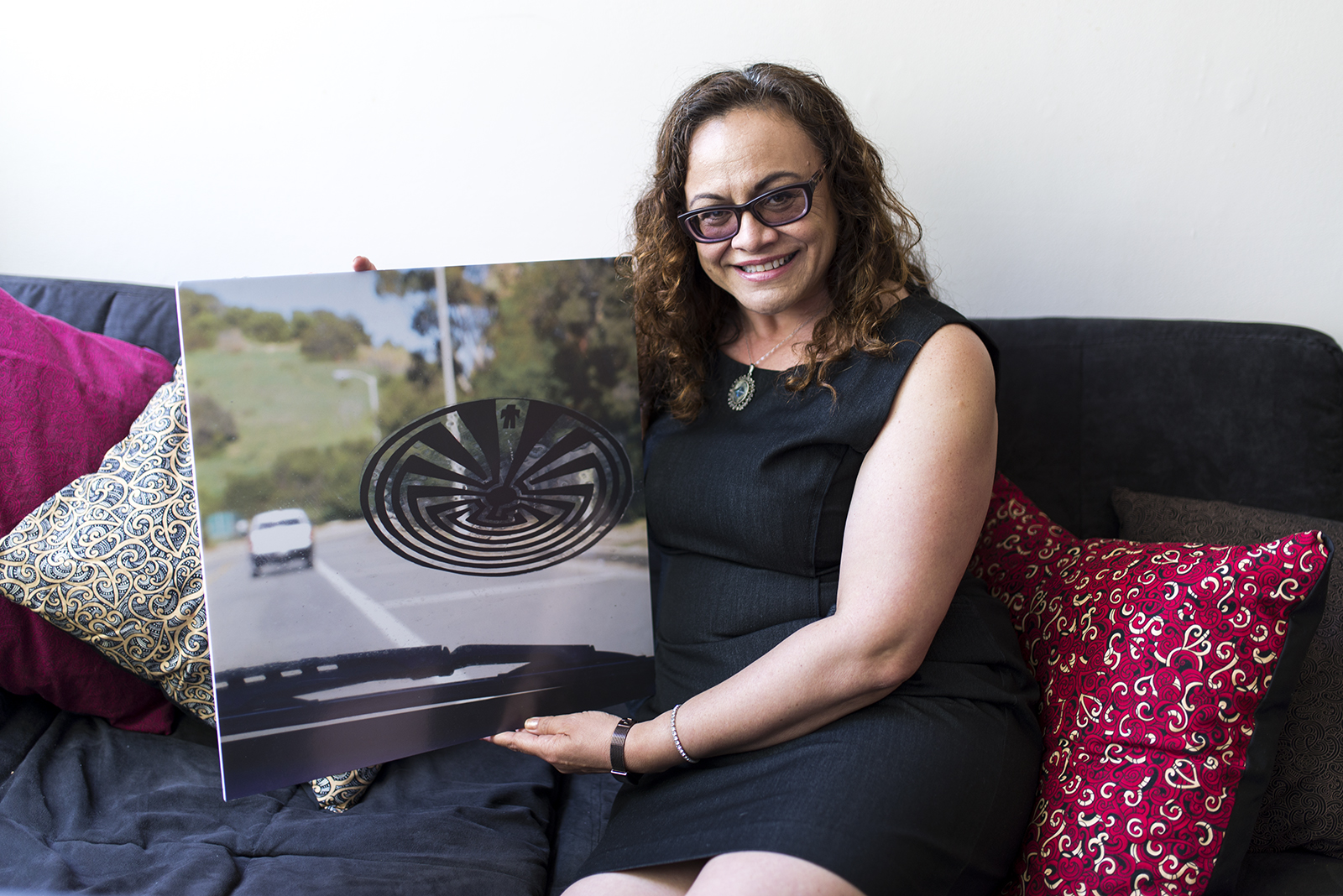Gender studies assistant professor dedicates career to social justice

Assistant gender studies professor, Michelle Erai, said she identified with this photo because it reminds her of the different possibilities she can always pursue. The photo, titled “Salt River, Pima,” was part of a project to encourage creativity in young Native Americans. (Angie Wang/Daily Bruin senior staff)
By Catherine Liberty Feliciano
March 12, 2015 12:45 a.m.
Michelle Erai was sick in bed, wearing her green flannel nightgown and sporting her “Polynesian ‘fro,” when her girlfriend asked her to marry her.
Marriage had not been a part of the UCLA assistant gender studies professor’s plan. She said she didn’t believe in it. She had suffered abusive relationships and studied the history of marriage as a social tool used to control women. She never imagined herself wearing a ring to symbolize her life was bound to someone else’s.
That was until her girlfriend Gwenn Vallone proposed and became her fiancé.
The proposal was supposed to be set in a carriage ride through Central Park during their vacation in New York City, but Vallone, a UCLA alumna, reasoned that if she couldn’t propose to Erai at her worst, then she couldn’t ask her to spend the rest of her life with her.

“I was thinking, she looks beautiful no matter,” Vallone said. “What would be more romantic than getting down on one knee and proposing to her when she felt and looked her worst?”
Bo Hwang, a third-year gender studies student, heard this story last month at a faculty-in-residence dinner focused on lesbian, gay, bisexual and transgender issues. He said it gave him hope that he would one day get married. Hwang, who identifies as queer, said he thought he would never find a partner because of a societal expectation to be cisgender and heterosexual.
Erai said she wanted to participate in the dinner after she learned about the Gender, Sexuality and Society” themed community, a floor on the Hill meant for queer residents that started last year. Erai, who has lived on the Hill since 2010, said she hadn’t directly worked with the student community until recently.
She said she wants to be a resource to students and talk about the different ways they could advocate for themselves at UCLA. She added that she wants to act as a liaison between herself and UCLA Center for the Study of Women, where she works.
Erai identifies as takatāpui, a term used by individuals who are Māori, the indigenous people of New Zealand, and queer.
She said that because she had to reconcile her love for her heritage with homophobia she experienced within the Māori community, she wants to help students who may be facing similar struggles.
Erai left home at the age of 17 because of pressure from her boyfriend’s family to get married and have children, she said. She ran away to become a hotel receptionist and became involved with a violent man.
It wasn’t until she met a group of women who advocated for women and children in abusive situations that she broke away, she said. She met a woman and thought her admiration for her was strictly platonic, until they kissed. It was then that Erai realized she also liked women, she said.
From there, she went to the Victoria University of Wellington where she studied sociology and gender studies.
In the 1990s, some Māori were responding to British colonization by reconnecting with their heritage, Erai said. Because she wasn’t fluent in the Māori language, was unfamiliar with her genealogy and was queer, Erai said she did not feel authentically Māori.
Her relationship with a white woman made it difficult for her to find a community where she felt accepted, she said. She knew she could not fit in with the expectation to be heterosexual and fall into traditional gender roles, she added.
Sharon Lee, a first-year undeclared student, said she did not realize some people felt divided between their queer and cultural identities before Erai shared her experience with students over dinner.
She said she attended the dinner to learn how to be a better ally to the queer community.
After she received her masters degree in social science research at the Victoria University of Wellington, Erai said she moved to the United States and later co-founded Incite! Women of Color Against Violence, a national group that advocates for women of color. She earned her doctorate degree at UC Santa Cruz with Andrea Smith, a friend and colleague she met while volunteering for a conference.
Smith is now an associate professor of media and cultural studies at UC Riverside. She said she thinks Erai is focused on organizing communities into political action and not just posing theoretical questions.
“At the conference, a lot of people who were academics didn’t want to be a part of Incite! because it wouldn’t build their careers, but (Erai’s) primary commitment is to make movements, not to make a career,” Smith said.
Erai said she thinks her teaching is an avenue for political efficacy and is the best use of her skills for social justice.She added that the study of indigenous peoples is especially important to her as Māori because she has experienced the consequences of colonialism on her culture. She feels responsible for educating her students about the realities of Native Americans, she said.
Hwang said he thinks Erai’s identity as takatāpui in professional spaces is important because she increases the visibility of Māori and queer issues, and actively works to advance them in her teaching.
He added that he thinks she lets her communities know that, despite the obstacles, happiness is possible.


